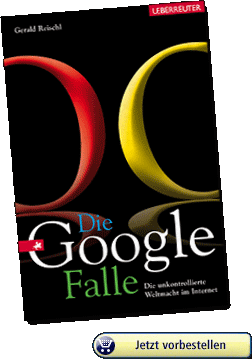The Book
 It takes quite a bit of courage to write a book about Google that approaches the company critically, highlighting the downsides of the hippest start-up of the IT-era, and acts as an outspoken warning of this corporation. I was repetitively asked whether I am scared of Google’s power and lawyers when I present an insight into Google’s dark side. I am not worried, because the nine months, which I spent on research, yielded nothing but airtight facts. But a certain amount of courage was still necessary.
It takes quite a bit of courage to write a book about Google that approaches the company critically, highlighting the downsides of the hippest start-up of the IT-era, and acts as an outspoken warning of this corporation. I was repetitively asked whether I am scared of Google’s power and lawyers when I present an insight into Google’s dark side. I am not worried, because the nine months, which I spent on research, yielded nothing but airtight facts. But a certain amount of courage was still necessary.
First, because the Internet-community maintains a positive view of the Californian Mountain View based enterprise. Google is known as a hip, cool, colorful, friendly and first-class employer – and outspoken critics are all but appreciated. They experience anger in most online forums.
Second, because more and more people voiced their critical view of the company, expressing their worry about the unparalleled power of the enterprise and requesting that the company is split in parts. Among the Google supporters, this is known as “Google-Bashing.” Especially competitors of the enterprise facilitate this sentiment: Microsoft commissioned a PR Agency (Burson-Marsteller) shortly after Google announced its plans to acquire the online-advertising company DoubleClick to inform on the “evil” practices of Google. One is easily accused of joining the trend of Google-Bashing for lucrative purposes. And that brings us to the third point: anyone that criticizes Google is automatically considered to be a Google-Basher. Hence it was necessary to write the world’s first book criticizing Google: “The Google-Trap”.
Google was, of course, instrumental in helping me write this book. Not only in the form of numerous interviews at the Googleplex in Mountain View (California), San Francisco, or on the phone, but also as a powerful search engine. Google is practical and can be useful – but only if one knows how to search. Google’s search techniques helped to find information that, if I had had to use the old-fashioned search methods - long telephone calls, research in newspaper archives and libraries - would have been very tedious. For example, the search for those patents that show Google’s true colors. Nowadays, nearly everything is possible at the push of a button. We merely have to type a query into a search engine and press “enter” – that’s it.
The main source of information for “The Google-Trap” was, of course, not the Google search itself, but the knowledge of dozens of experts, from whom I, in interviews, discussions and emails, learned more detailed information about the search-behemoth. The title “The Google-Trap” indicates that the book is not an optimistic success story, like David Vise with his Pulitzer Prize-winning book “The Google-Story”.
“The Google-Trap” has a different goal – it is meant to contribute to a more wholistic view of the search engine, depict the dichotomous nature of the web, highlight Europe’s failures and indicate to what we should pay attention when using the Internet for our purposes. Facts and figures prove that Google is the most avid collector of data of our time, that Google patented various methods of tracking, analyzing and archiving Internet-users, that the promise not to analyze data and to delete search data after 18 months are nothing but a lip service and why information about users are essential for the company to be successful in the future. “The Google-Trap” also presents Google’s future plans, the reasons why the enterprise wants to join the telecommunications- and mobile phone markets and how it plans to dominate the advertisement industry in all its forms: online, in print-media and even on TV. And when Google works on projects that involve medical developments, genetics and stem-cell research, we should begin worrying about the plans of the enterprise. Google is no longer an ordinary search engine – it is one of the most valuable companies of the 21st century that, thanks to an exceptional PR-strategy and a large number of enthusiastic Internet-users, has made its bosses to the richest businessmen in the world; all at the expense of data protection.
The world is a sphere, it shouldn’t become a Google.
Gerald Reischl in March 2008


















